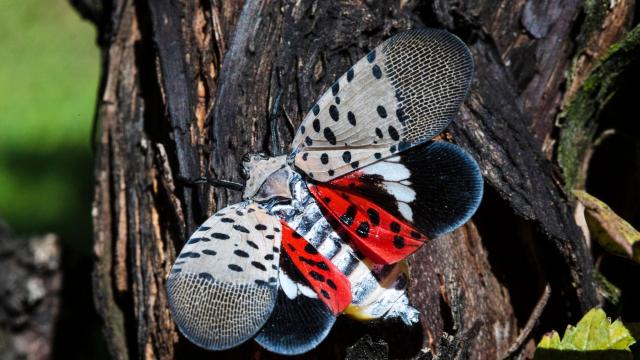Move over, murder hornets. There’s a new invasive bug in town: the spotted lanternfly.
The bugs first arrived in Pennsylvania in 2014, but they’re spreading across the Northeast of America. Eight New Jersey counties have been labelled as quarantine zones by the state Department of Agriculture, meaning anyone leaving those counties should make sure no lanternflies are hitching a ride. Other states are cracking down and asking residents to kill any of the invasive bugs they find.
These easily recognisable insects measure up to 2.5 centimetres in length. When they’re fully grown, their front wings are white with black speckles, and their hind wings are fire-engine red with black spots. And they can’t fly very far, so they cartoonishly hop between plants. Unlike murder hornets, they don’t actually sting or bite.
Instead, they pose a threat to agriculture. Spotted lanternflies infest fruit trees and suck out the sap. They can also eat their way through agricultural fields. When the bugs chow down, they excrete a sticky goop called honeydew which forms a film on plants and interferes with photosynthesis, reducing crop yields.
“The biggest concern is it could devastate our forests, our neighbourhoods, and our agriculture,” said Susan Ndiaye, community horticulture educator at the Cornell Cooperative Extension of Orange County in Middletown, New York, told the Times Union. “It could cause damage to trees and kill grapes.”
The spotted lanternfly is indigenous to parts of southern China, Taiwan, and Vietnam. Researchers believe lanternfly eggs came to the U.S. when they got stuck on a shipment of stone. The bugs were first spotted flying in the country in Berks County, Pennsylvania in 2014, and the invasion has since spread to a dozen northeastern states from Maine to North Carolina. There have also been sightings in Rhode Island and as far west as Oregon as well.
In addition to the eight counties in New Jersey under quarantine, 34 in Pennsylvania are in the same state. That means residents and visitors don’t just have to check their shoes and shoulders for lanternflies, it also restricts the transport of wood products, yard waste, construction materials, plants, and other outdoor equipment. It may sound weird to take these precautions, but they could work because the insects spread like little hitchhikers, attaching themselves to camping gear, Christmas trees, and whatever else they can get onto.
If you come across these bugs, experts say you should report them to agricultural officials and then murder them — seriously. The New Jersey Department of Agriculture suggests using chemical pest controls. Or alternatively, the New York City Parks Department says you can straight up stomp on them.
“Harming our city’s wildlife is prohibited, but in an effort to slow the spread of this troublesome species, we are putting out a one-time call: if you see a spotted lanternfly, please squish and dispose of this invasive pest,” the department said in a statement.
